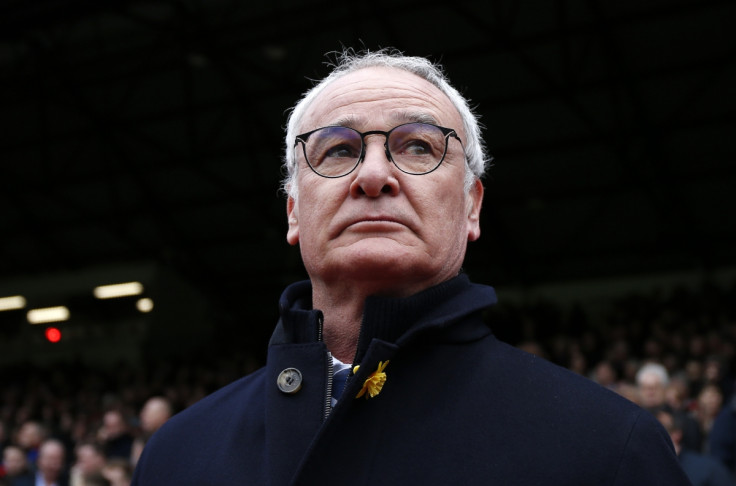Leicester City win the Premier League: How Claudio Ranieri went from tinkerman to title winner

"Following today's devastating result for the national team, I take full responsibility for the most unfortunate choice of coach, which has resulted in such a poor image of the national team being put before the fans."
Those were the words spoken by irate former Hellenic Football Federation (HFF) president Giorgos Sarris after Greece's humiliating 1-0 Euro 2016 qualifying Group F home defeat to the lowly Faroe Islands 17 months ago, an appalling result that cost manager Claudio Ranieri his job just three defeats and one draw after being appointed as successor to Fernando Santos.
It was that bleak stint, coupled with a less-than-stellar reputation as a hopelessly eccentric 'tinkerman', that led to much confusion and ridicule when the 64-year-old was named as Nigel Pearson's replacement at Leicester City in July 2015.
Having not appeared on these shores since being ousted in favour of Jose Mourinho one year into the Roman Abramovich era at Chelsea, Ranieri, who has taken charge of Valencia, Parma, Juventus, Roma, Inter Milan and Monaco since leaving Stamford Bridge, hardly seemed an ideal candidate to steer the Foxes through an inevitable relegation battle and maintain the momentum generated throughout a quite incredible great escape.
Claudio Ranieri? Really?
— Gary Lineker (@GaryLineker) 13 July 2015
"Claudio Ranieri? Really?" was the public reaction of former Leicester striker, Match of the Day presenter and crisp aficionado Gary Lineker, who has never been reluctant to voice his thoughts on his hometown club.
IBTimes UK was certainly not immune from the kneejerk tide of criticism, either. In a season preview, my colleague Tony Mogan succinctly labelled the decision as just a "terrible, terrible appointment for both parties", while sport editor Nick Howson asserted that the man simply "exerted failure".
So just how has Ranieri managed to effectively rewrite his own reputation and help Leicester to produce arguably the biggest shock in English football history?
A distinct lack of tinkering
Notorious for his chopping and changing of personnel after spending in excess of £100m at Chelsea, Ranieri has resisted the urge to needlessly tinker with his squad at the King Power Stadium. Instead he has relied upon the sheer consistency of the same core group.

Leicester, who have admittedly had Lady Luck firmly in their corner when it comes to injuries, named an unchanged side in 12 of their last 15 top-flight outings before being forced to alter things slightly to cater for the suspension of Jamie Vardy. They have actually used just 23 players in total this term, the lowest number of any Premier League club – one less than second-place Tottenham Hotspur.
Sensible January approach
In a similar vein, a measured and rational strategy adopted during the January transfer window has also proved crucial. Level on points with leaders Arsenal heading into the New Year, Leicester might have been tempted to loosen the purse strings and invite owner Vichai Srivaddhanaprabha to lavish millions on a string of high-profile new recruits with the intention of reinforcing the most unlikely of title bids.
Instead, Ranieri made just three relatively low-key additions, looking more towards the future by snapping up one of the Football League's most impressive young talents in Birmingham City winger Demarai Gray on a four-and-a-half year deal. Versatile Ghana international Daniel Amartey also arrived from FC Copenhagen, and Danish U-19 goalkeeper Daniel Iversen was signed from Esbjerg.
A new frontman to complement the established trio of Vardy, Shinji Okazaki and Leonardo Ulloa was also on the agenda after loaning club-record signing Andrej Kramaric to Hoffenheim, but the pursuit of Eder eventually proved unsuccessful as he left Sampdoria for Inter. Potential deals for the likes of Ahmed Musa, Dwight Gayle and Loic Remy did not come off either, but that disappointment did not halt their significant progress.
Retaining Pearson's backroom staff
Ranieri wasted little time in instigating a purge of Chelsea's backroom staff after taking over from Gianluca Vialli in 2000, swiftly moving on the likes of Ray Wilkins and Graham Rix before a change in role led to the resignation of goalkeeping coach Eddie Niedzwiecki. A new manager's desire to bring in his own trusted assistants is certainly nothing new or surprising, but such a quick overhaul can often have an adverse effect – as evidenced by David Moyes' failed stint at Manchester United.

That approach has been revised since and another key aspect in the Italian's success in the East Midlands has been the stabilising presence of assistants Craig Shakespeare and Steve Walsh, both of whom were mainstays of the previous regime. The latter's influence has been especially evident in his role as head of recruitment, with tireless midfielder N'Golo Kante proving a revelation and earning a PFA Player of the Year nomination following his move from Caen last summer. The rise to global prominence of award winner Riyad Mahrez has also been a testament to his scouting skills.
Pragmatism
Along with his usual amusing quotes and zany catchphrases, one constant theme of Ranieri's press conferences this term has been his pragmatic attitude and almost a genuine unwillingness to accept that Leicester had indeed morphed from relegation fodder into title contenders. A refusal to get carried away was evident in his persistent assertions that the team were simply looking to secure enough points for survival, and this approach undoubtedly helped his players not to get too far ahead of themselves.
Only when Champions League qualification was sealed after a 2-0 win over Sunderland and with five matches left to play did the manager finally appear to concede that they were aiming to win the whole thing.
Sticking to a style that works
This may not seem like rocket science, but pivotal to Leicester's rise has been their style which, much to the chagrin of Arsenal and Spurs supporters alike, is not built upon swashbuckling and attractive passing football. To label them as just a long-ball team would be slightly unfair, but there is no doubt that constant possession is not a priority in their traditional 4-4-2 system.
Instead, they are quite content to let their opponents keep hold of the ball and rely upon their solid defensive unit, brilliantly marshalled by captain Wes Morgan and uncompromising centre-back partner Roberth Huth, to snuff out any danger before using Mahrez's trickery and Vardy's pace on the counter. It may not always be pretty, but it's hard to argue that such a direct style is not ruthlessly effective.
© Copyright IBTimes 2025. All rights reserved.






















